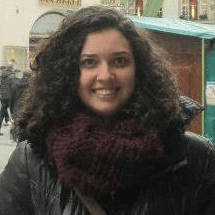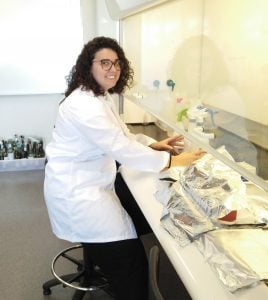Could you tell us a bit about yourself and your academic background?
 I studied a Bachelor in Food and Engineering at the Universidade Federal de Lavras in Lavras, Brazil. At school, I was always interested in learning more about biological and chemical processes. As funny as it sounds, I decided that I wanted to learn more about food after I watched a documentary on TV on how chocolate is made! Being obsessed with chocolate at the time, that was a decisive moment for me. After my first year of college I realised that Food Engineering had nothing to do with what Willy Wonka does. It was kind of frustrating (who doesn’t want to work in Willy Wonka’s Chocolate factory?) but clarifying at the same time. I realised that there was so much more to Food and Engineering, it was about solving problems and challenges and that is what I love about it!
I studied a Bachelor in Food and Engineering at the Universidade Federal de Lavras in Lavras, Brazil. At school, I was always interested in learning more about biological and chemical processes. As funny as it sounds, I decided that I wanted to learn more about food after I watched a documentary on TV on how chocolate is made! Being obsessed with chocolate at the time, that was a decisive moment for me. After my first year of college I realised that Food Engineering had nothing to do with what Willy Wonka does. It was kind of frustrating (who doesn’t want to work in Willy Wonka’s Chocolate factory?) but clarifying at the same time. I realised that there was so much more to Food and Engineering, it was about solving problems and challenges and that is what I love about it!
I started off with a coffee sensory background. My father was manager of a coffee farm for 25 years, and every winter break since I was little I would spend my days running around coffee trees during the harvesting. When I went to college, I had the opportunity to work in a post-harvest coffee lab where I could help PhD and Masters students with their experiments- preparing samples and materials for sensory analysis and treatments. In the meantime, I was working for a coffee roaster with their quality assurance plan as a Technical Manager. During 2013, I was able to go to England and work for a month at Taylor’s of Harrogate. There I was able to taste all the daily coffee deliveries and production as well as providing support in the coffee and tea tasting room preparing samples for coffee buyers to taste.
From August 2013 to September 2014, I did an exchange to the University of Kentucky, studying Food Science. What was really different, and what I really liked about the University of Kentucky, was its connection with industry. We had field trips to food industries every week and we were always very well received. The course I did there was really focused on the practical, rather than the theoretical point of view, that I was used to in Brazil. I think that was the best thing for me- I was able to experience and learn from both sides, which made me a more complete professional. Food Science is more focused on the biological and chemical processes involved in food and beverage manufacturing while Food Engineering gives you the mathematical and physics point of view involved in those processes. This means you have the tools to design equipment and plants involved in food and beverage manufacturing.
I wanted to do a Masters in Australia after I graduated, so I looked into the most popular and also the top universities- that was when I came across the Training Centre for Innovative Wine Production on the University of Adelaide website. I decided that I wanted to do it and looked into the different areas of research I could do. That was when my interest in wine research began. Since I’ve been exposed to this area, I have found it to be really interesting. I really like challenges, so I was attracted to looking into a new direction. Thankfully, my previous skills and knowledge can be translated to wine research!
Could you introduce us to your project and what it involves?
 My project will involve investigating the distinct flavours of South Australian Coonawarra region Cabernet Sauvignon. It’s probably not surprising that my industry partner is the Coonawarra region. We are going to do this through a sensory panel that will compare wines from different regions and focus on the flavours that are distinct or only present in Coonawarra wines. I am then going to relate these distinctive flavours back to chemical compounds that are responsible for the sensory attributes.
My project will involve investigating the distinct flavours of South Australian Coonawarra region Cabernet Sauvignon. It’s probably not surprising that my industry partner is the Coonawarra region. We are going to do this through a sensory panel that will compare wines from different regions and focus on the flavours that are distinct or only present in Coonawarra wines. I am then going to relate these distinctive flavours back to chemical compounds that are responsible for the sensory attributes.
As part of preparing for my project, my supervisor, project team and I did a trip out to the Coonawarra region, during which we were able to meet our industry partner. We were able to introduce ourselves and talk to them about our expectations and aims of our research, as well as what we intend to do to achieve that. We did a wine tasting with a range of Cabernet Sauvignon wines to get an idea about the wines we could use, and their inputs on those. Having the opportunity to discuss the project with our industry partners was really helpful to understand their opinions about the wines they are producing and what they are trying to achieve.
What can you see yourself doing in the future?
Before I arrived here, I was really excited to read literature reviews and get to know the project I would be working on, what I might be doing and the region I would be researching. Now that I’ve spent some time here, I am more excited to finish reading and researching and start working on the project by setting up my experiments. For my future, I want to continue my career in Australia in wine research. I’m thinking about branching out into academia to teach, as I like it and think it would be interesting.
